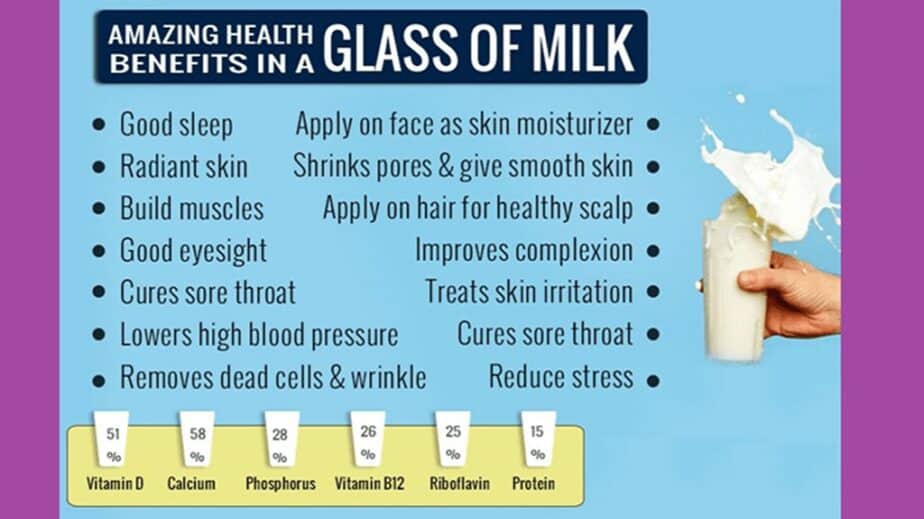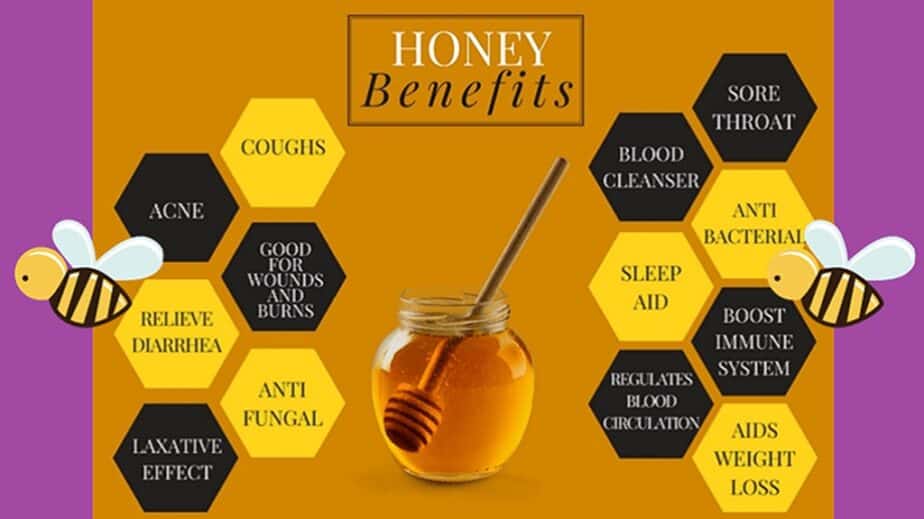Drinking milk with honey is a traditional recipe known for its several health benefits.
At the same time, there are several doubts and misconceptions about consuming or using warm milk and honey together. Some say they together produce toxic effects in our bodies. However, there is no scientific evidence supporting such claims.
But both contain several essential vitamins and nutrients that are great for health. They improve your immunity and keep your skin and hair healthy.
Milk Nutrition Facts and Calories
According to SELF Nutrition Data, one cup of whole cow’s milk contains:
- Calories: 146
- Protein: 8 grams
- Fat: 8 grams
- Riboflavin (B2): 26% of the RDA
- Vitamin B12: 18% of the RDA
- Calcium: 28% of the RDA
- Vitamin D: 24% of the RDA
- Potassium: 10% of the RDA
- Phosphorus: 22% of the RDA
- Selenium: 13% of the RDA
Milk is one of the best sources of vitamin B12, vitamin D, riboflavin, calcium, and phosphorus. Additionally, milk contains a good amount of protein and hundreds of fatty acids, including conjugated linoleic acid (CLA) and omega-3s.
What is bad about milk is the high content of saturated fat in it. A major portion of the calories in milk come from sugar.

Honey Nutrition Facts and Calories
According to SELF Nutrition Data, 100 g of honey contains:
- Calorie: 304
- Protein: 3g
- Vitamin C: 1% of the RDA
- Riboflavin: 2% of the RDA
- Niacin: 1% of the RDA
- Vitamin B: 1% of the RDA
- Pantothenic Acid: 1% of the RDA
- Calcium: 1% of the RDA
- Iron: 2% of the RDA
- Potassium: 1% of the RDA
- Copper: 2% of the RDA
- Manganese: 4% of the RDA
- Selenium: 1% of the RDA
- Zinc: 1% of the RDA
On a positive note, honey is rich in good cholesterol, antioxidants, and anti-microbial properties.
The high amount of sugar-based calories in honey may be bad for some, especially those with diabetic issues.

Related: 9 Important Reasons for Drinking Honey Water Every Day
What makes honey and milk a good combination?
A combination of milk and honey is a healthy diet because of its rich nutritional value.
Honey is a traditional home remedy for several common health issues. It is rich in anti-fungal and antibacterial properties and antioxidants. Also, it is known for its anti-inflammatory capacity, minimizing the effects of inflammatory issues affecting the skin and respiratory system.
Milk is considered a life-giving food that provides vital vitamins and minerals for the growth and protection of the body. It gives your body much-needed vitamins A and D, B vitamins, calcium, and amino acids.
A mixture of milk and honey turns out to be wholesome food. Together, they can supply almost all the essential nutrients to the body.
They are two potential ingredients in various home remedies for treating various hair and skin conditions.
Finally, the mixture of these two foods gives them a nice taste and flavor. They would not cause any side effects to the skin, hair, or body if used moderately.
Expected Health Benefits of Using Honey and Milk
Combining milk and honey results in some unique and desirable health benefits. Some of the benefits you can expect from them are:
1. You may improve stamina and strength
- Milk supplies carbohydrates, proteins, and essential nutrients.
- Honey improves the metabolic rate and accelerates the production of energy.
- Both are quickly digested and absorbed by our digestive system
2. Improves digestion by promoting the growth of probiotic bacteria
- Honey helps in the growth of probiotic bacteria in the stomach.
- Lactic acid bacteria (LAB) in fermented milk are probiotic bacteria.
- They help to eliminate bloating, constipation, and cramps.
3. It may cure insomnia by increasing the production of melatonin
- Milk and honey prompt the brain to increase the release of insulin and tryptophan.
- Tryptophan is eventually converted to serotonin and then melatonin, responsible for sleep.
- Milk also contains calcium; maintaining calcium levels can help a person sleep well.
4. Calcium, phosphorus, and protein from milk improve bone health
- Honey contains enzymes that improve the absorption of nutrients during digestion.
- Calcium from milk gets better absorbed by the body because of honey.
- A steady calcium supply improves bone health.
5. Their antibacterial effects reduce common infections
- Honey contains potential anti-microbial properties and antioxidants.
- A mixture of honey and milk works well for respiratory tract infections.
- May cure intestinal disorders caused by microbial organisms
6. Reduces stress by increasing the output of serotonin
- Drinking a milk and honey mixture increases the release of serotonin and lowers cortisol levels.
- Natural enzymes in honey act as mood lifters.
7. An increase in serotonin release may improve the concentration
- Sugar from honey provides energy for mental and physical activities.
- Reduces mental tiredness and increases the release of serotonin, which results in better concentration.
8. They optimize athletic performance by increasing stamina
Those consuming milk and honey perform better in athletics because of the following:
- Increase in stamina
- Lower stress and better concentration
- Better supply of carbohydrates and protein
- Optimal sugar levels and glycogen restoration
9. Improves skin health through an adequate supply of vital nutrients
Both honey and milk contain important nutrients for the skin, like:
- Proteins and amino acids
- Vitamins and minerals
10. They contain moisturizing and anti-aging properties
Honey and milk, when used as ingredients in natural skincare packs:
- Moisturizes the skin
- Improves elasticity and reduces wrinkles
- Reduces scars, blemishes, and hyperpigmentation
- Honey heals the skin from infections and burns.
11. A good conditioner and moisturizer for hair
Hair masks containing honey and milk may act as:
- Moisturizer for the hair
- Conditioner that makes the hair smooth and shiny
- Removes dryness and manages frizzy hair
Does Honey Become Toxic In Warm Milk or Water?
Consuming honey mixed with warm milk or water may produce toxic effects on the body. That’s what some say.
The ancient principles of Indian Ayurveda strongly disagree with the idea of heating honey. You may also find many rumors about the fatal consequences of consuming heated honey.
It is believed that heating anything with sugar content may release a chemical called 5-hydroxymethylfurfural, or HMF. The chemical is considered to be carcinogenic.
Going by this proposition, heating anything with sugar should be toxic. But we consume so many cooked delicacies with sugar in them. Eating them has not fatally harmed us.
According to a study by the National Center for Biotechnology Information, only a meager increase in HMF was noticed after heating the honey to 140 degrees Celsius. The amount of HMF in heated honey was from 25 parts per million to 75 ppm. There is a negligible amount of HMF already present in a lot of other foods we eat.
So it is safe to add honey to boiling milk. However, overheating honey can lead to the loss of natural nutrients. So, it is better to add honey to lukewarm or cold milk.
Final Thought
Milk and honey drinks have excellent health benefits from a variety of healthy nutrients in them.
Don’t be afraid to mix honey with hot milk or water, as it does not produce toxic effects capable of harming our bodies. The best way to enjoy milk with honey is to mix the two when the milk is cooled down.
You can also use milk and honey as ingredients in your homemade hair and skin care remedies.
